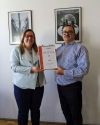Decent Incomes for All. Improving Policies in Europe - a new book from Oxford University Press, with contributions of Tarki staff.
Published by Oxford University Press, the authors of the new book (edited by Bea Cantillon, Tim Goedemé, and John Hills), shed new light on recent poverty trends in the European Union and the corresponding responses by European welfare states. They analyze the effect of social and fiscal policies before, during, and after the recent economic crisis and study the impact of alternative policy packages on poverty and inequality. Tarki staff contributed to Chapter 1 on reference budgets and Chapter 2 on employment and poverty dynamics before, during, and after the crisis in Europe.
For more on the book: https://global.oup.com/academic/product/decent-incomes-for-all-9780190849696?cc=hu&lang=en&#
New book on "Rent-Seekers, Profits, Wages and Inequality"
The book of Iván Szelényi (Tárki board member, Yale and NYU Emeritus Professor), co-authored with Péter Mihályi (Professor at CEU and Corvinus University), published by Palgrave Macmillan, provides a timely contribution to contemporary debates about inequality of incomes and wealth. It focuses on the top earning 20% of society (rather than the top 1 or 0.1%), addresses the role of rent in issues such as class reproduction, wealth, sources of social instability and inequality, and provides a “post-classical” narrative of political economy.
To download the pdf version of the book, plese click here.
The final report of our research on trust in institutions has been published
Commissioned by Eurofound, the project aimed to analyze trends of trust in national and EU institutions. The final report of the research, titled Societal change and trust in institutions is written by Zsolt Boda, Márton Medgyesi, Nicole Fondeville and Erhan Özdemir. It focuses on patterns of change since the turn of this century, and possible explanations for these patterns at national and EU level. The report also seeks to identify the societal groups for whom trust has declined the most, paying particular attention to the relationship between confidence in national institutions and in the EU. Finally, it examines the implications for policy of changes in trust.
Webinar FAIR data in practice: From FAIRy tale to FAIR enough
FAIR: Findable, Accessible, Interoperable, Reusable
The webinar will start with a short introduction on FAIR data, its status and use within the scientific community. The first part will consist of a presentation of the FAIR data checklist for researchers. This checklist is designed to support researchers with little experience in depositing and sharing their data digitally. The demonstration of the checklist during the webinar will show how the researcher is guided through questions that help assess the degree to which her or his data is deposited in a FAIR way.
Megjelent a Tárki "Társadalmi riport 2018" című kötete
A sorozat 15. kötetét 2018. november 6-án mutatta be a Rózsavölgyi Szalonban a Tárki az érdeklődő közönségnek. Tóth István György és Kolosi Tamás összefoglaló beszédei után négy szerző mutatta be tanulmányát: Szivós Péter, Szelényi Iván, Branyiczki Réka, és Medgyesi Márton. A kötet teljes terjedelmében letölthető itt. A sajtómegjelenések folyamatosan feltöltésre kerülnek.
Elkészült Kopasz Marianna és Gábos András tanulmánya, A segélyezési rendszer 2015. március 1-jei átalakításának hatásai címmel.
A szociális támogatások rendszere 2015. március 1-jével jelentősen átalakult. A TÁRKI, az EMMI Szociális Ügyekért és Társadalmi Felzárkózásért Felelős Államtitkársága megbízásából, kutatást végzett azzal a céllal, hogy feltárja, hogyan alakult az ellátásokban részesítettek száma és a segélyezésre fordított kiadások nagysága a szabályozásmódosítást követően. A kutatás egy olyan településsoros adatbázisra épül, amely a 2006-2016 közötti időszakra vonatkozóan tartalmazza a segélyezettek számát és a segélyre fordított kiadásokat, illetve egyéb, a kutatási cél szempontjából fontos települési szintű változókat. A kutatási jelentés innen tölthető le.
Invitation to CESSDA Webinar - Data in Europe: Poverty
A free webinar for anyone interested in data for research on poverty. Hosted by the CESSDA training group, this one-hour webinar will explore data available for researching poverty and its impact. The webinar will include three presentations with time for questions.
With Eurostat estimating that in 2015, 119 million people, or 23.8% of the EU population, were at risk of poverty or social exclusion, poverty remains an important research topic in the context of Europe. Hosted by the CESSDA training group, this one-hour webinar will explore data available for researching poverty and its impact. The webinar will include three presentations with time for questions.
Ismét Kiváló Üzleti Márka Díjat nyert a Tárki
 A korábbi évek után a Tárki Zrt. 2018-ban ismét elnyerte a MagyarBrands elismerését Kiváló Üzleti Márka kategóriában. A MagyarBrands program immáron kilencedik éve díjazza a magyar vonatkozású márkák közül a legeredményesebbeket. A díjazással a magyar szellemi munka méltó képviselőire hívja fel a figyelmet a program. A Kiváló Üzleti Márka díj odaítéléséről számszerűsíthető kritériumok alapján, a cégek identitása, reputációja, márkaépítése, tradíciója és megbízhatósága alapján a független Szakmai Bizottság döntött.
A korábbi évek után a Tárki Zrt. 2018-ban ismét elnyerte a MagyarBrands elismerését Kiváló Üzleti Márka kategóriában. A MagyarBrands program immáron kilencedik éve díjazza a magyar vonatkozású márkák közül a legeredményesebbeket. A díjazással a magyar szellemi munka méltó képviselőire hívja fel a figyelmet a program. A Kiváló Üzleti Márka díj odaítéléséről számszerűsíthető kritériumok alapján, a cégek identitása, reputációja, márkaépítése, tradíciója és megbízhatósága alapján a független Szakmai Bizottság döntött.
Dr. Róbert Péter a társadalmi mobilitásról beszélt a Magyarul Balóval című műsorban
Dr. Róbert Péter, a Tárki vezető kutatója a Magyarul Balóval című műsor szeptember 26-i vendége volt. A műsorban meghívott szakértők magyarországi gazdasági és társadalmi kérdéseket vitatnak meg. Dr. Róbert Péter, Bass László, és Radó Péter a társadalmi mobilitásról, egyenlőtlenségről, illetve az iskolarendszer szerepéről beszélgettek a szeptember 26-i adásban. A műsort ide kattintva nézheti meg.



